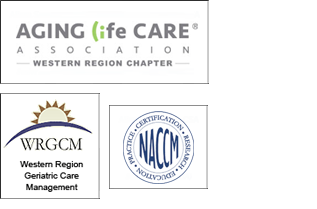Helping manage care of the aging
Geriatric care managers help elders and families navigate available health care options.
By Ilene Raymond Rush
Published: December 1, 2013
There had been telltale signs of dementia—repeating conversations, getting lost in stores, forgetting things.
But then came the day in February when Clare Day’s 82-year-old father dropped her 82-year-old mother off at the supermarket. By the time her sister had picked up her mother as planned and returned her to their Logan home, their father had vanished.
He had driven from Logan to Hulmeville in Bucks County, where “he ended up at the fire station,” says Day, 52, of South Philadelphia, who went with family to get him. “I took his car keys and drove the car home and have had it ever since.”
The sixth of eight children, Day had researched a care plan for her parents as their dementia worsened. But the family couldn’t reach a consensus. Finally, they approached geriatric care manager Joyce Gray of GrayCare in Lower Merion to help plan the next steps.
The demand for such geriatric care managers “will only grow,” says Kaaren Boothroyd, executive director of the National Association of Professional Geriatric Care Managers, the profession’s largest group, which saw a 5 percent increase in members from 2011 to 2012.
Driving the trend, she said, are the growing number of baby boomers nearing retirement, the byzantine world of health care, and new technology that can help elders stay in their homes.
To be certified, managers must have at least one degree in a field related to care management: counseling, nursing, mental health, social work, psychology, or gerontology. The group offers a directory of care managers at http://www.caremanager.org/.
“We’re often called in during a crisis,” says Helene Feldman of Helene Feldman Elder Care Management in Philadelphia, a 14-year veteran of the field. “I’m a resource and advocate to help people reduce stress, save time, and reduce time away from work. My role is to educate and find a balance for the family and for the designated person who needs the help.”
Although some long-term health insurance plans may pay for these services, it’s mainly a fee-for-service business with rates from $95 to $200 an hour. For some clients, a single consultation to review options may be all that’s needed, while others may remain with the care manager for a decade or longer.
Similar services can be found across the city and online, at the Philadelphia Corporation for Aging (215-765-9040), at partner agencies of the Jewish Federation, which include the Abramson Center (1-888-340-0080) and on the CARIE line, a free phone-based advocacy and one-on-one counseling service for the elderly at carie.org. 1-800-356-3606)
“We offer care managers that assess needs, develop a plan of care, assist with the plan and do follow-up care,” says Steve Touzell, director of long-term care at the Philadelphia Corporation for Aging. “Most of our public services are paid either by state or federal subsidies” or on a sliding fee scale.
Touzell recommends that people seeking private management look for reputable agencies and experienced staff with graduate degrees in social work, proper accreditation and experience.
Hiring a manager doesn’t always involve moving an elder person from home. “Most people don’t want to leave their homes,” Gray says. “And for some people with enough financial resources who can tolerate having people working and living in their homes, that can work out very well. . . . But when individuals can’t tolerate a revolving cast of people, we can also help with plan B.”
One job of a manager is to be “in the trenches,” Gray adds. “Some families with long-distance caregivers may need someone on the ground to see how a person is functioning: Is there food in the refrigerator? How is their personal hygiene?”
“This is intimate work,” Gray says. “We become very close with families and the older person. Older people with dementia can be very vulnerable, attach quickly and be free with information, no boundaries. You have to be careful who you let into that situation.”
Personalized care may also include attending visits to doctors as an advocate and to make sure the doctor is aware of all symptoms; arranging drugs; and overseeing the care of residents who live outside the home.
“Psychologically, it’s like having a partner,” says Gray. “You can get so caught up in the day-to-day minutiae of caring for the person that it’s hard to step back and look at the diagnosis and what are the long-term scenarios that I need to prepare for.”
For Day’s family, the first step was a consultation to decide if they needed a care manager. “We also wanted some expert input on what kind of facility we should be looking for. There are so many choices of type, style, cost, and location,” she said.
Gray was able “to help us name the things most important to us and narrow down our choices.”
The result is that Day and her siblings have made an application to an assisted living facility.
“The whole process is so emotionally fraught to begin with and the added element of adult siblings having to come together and make a decision makes it more so,” Day said. “Having an agreed upon expert to turn to has been quite helpful.”


